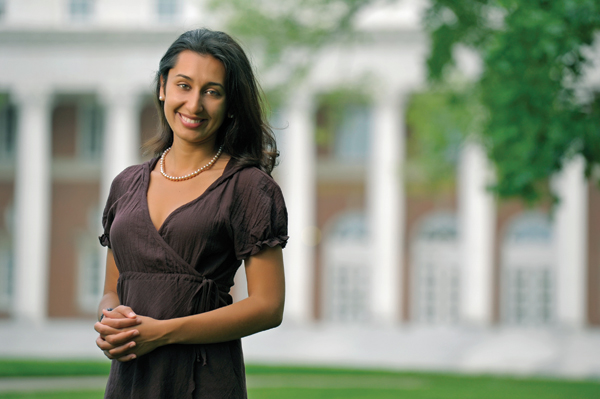Cristiana Grigore’s advocacy for social inclusion is a personal journey

Cristiana Grigore is outgoing and energetic. She is passionate and proud. She’s a rebel and a reformer.
She also is Roma.
The last label is one she has long resisted but now embraces. Roma are the largest ethnic minority in Grigore’s native Romania and in much of Europe. They are persecuted, marginalized and often live in poverty. Sometimes referred to as gypsies, they are known for their colorful clothing, nomadic lifestyle and dark skin and hair. They are sometimes reviled as thieves and considered intellectually inferior.
Although some idealize the Roma for their Bohemian lifestyle – they are known as travelers who freely live outside the system, for example – recent movements have sought to drive them out of France and Italy.
Grigore grew up in a small city in Southern Romania aware of her Roma heritage but not speaking the Romani language and living pretty much integrated into normal Romanian life. She pursued a degree in psychology at the University of Bucharest, then came to Vanderbilt as a Fulbright Fellow. She currently is a master’s degree candidate in international education policy and management at Peabody College of education and human development.
Over the course of her journey, Grigore not only has come to embrace her identity, but also to serve as an ambassador for her people. She frequently writes – as she did last November in an op-ed for The New York Times – and speaks about the modern Roma experience. Last fall, CNN aired a segment on the “Plight of the Roma” in Romania in which Grigore was shown visiting her family and mentioned as a rare example of Roma children who receive a good education and the possibility for success.
“I will not deny the fact that I am Roma. I am even happy I am Roma,” Grigore said. “At the same time, [rquote]I don’t want to be put only in the ‘Roma’ box. People should not be reduced to their ethnicity. This simplifies their complexities as human beings.[/rquote]”
Her adviser, Brian Heuser, has watched Grigore’s labels of herself expand.
“She has called herself an educator, a writer and an entrepreneur. What differentiates her from others is her identification as a global citizen rather than only as Roma or Romanian,” he said.
“My job is to challenge stereotypes, educate people and think about better educational and social policies,” Grigore said. “If that is what makes me a role model, then that’s wonderful.”
Heuser, assistant professor of the practice in international education and public policy, remarked that Grigore’s success in the world of higher education makes her a role model in a new kind of context. Before receiving the Fulbright to begin her studies here, Grigore started a nonprofit, Link Education and Practice (LEAP), to help reform the education system in her home country.
As a University of Bucharest student, Grigore participated in a brief exchange program to the United States where she saw firsthand the emphasis American universities place on service learning and other non-formal education practices as vital components of the college curriculum. She returned to Bucharest with the desire to make a difference in her country and convinced that Romanian students should have more opportunities to develop similar non-formal education skills through extracurricular activities, internships, exchanges, grassroots undertakings and volunteer activities. Grigore embarked on four years of volunteer work herself.
Students must complete a final thesis before graduating from the University of Bucharest, and Grigore poured all of her energy into designing and writing a thesis around the theme of civic service as a component of education.
“I took it extremely seriously,” she said. “I wanted to do something that was practical and would make a difference at the national level. I saw it as a way for me to begin my career.” Instead, Grigore, who was a top student, received a failing grade on her thesis. She believes it was because she challenged the current education system in Romania.
“I was telling them, ‘What you are doing is not enough,’ and I tried to find innovative ways to improve the system,” she said. Grigore’s thesis and her desire to better understand the Romanian educational system contributed to the founding of LEAP. (And, yes – she eventually passed and received her university degree.) Grigore spent two years after leaving the university knocking on doors and making the case for LEAP, whose goal is to promote non-formal education and its role in developing the employability of youth.
“I was involved in creating an organization from the beginning and transforming it into something meaningful and making it sustainable,” she said. “I am very proud of the team I worked with to create LEAP and the synergy among us.”
Leaving LEAP in the care of others to study education policy at Peabody was a hard decision, but ultimately, “I have to continue my education to become more aware of what is happening at the international level,” she said. “If I’m fulfilled and educated, then I will be better able to make a difference.” Grigore also left behind developing projects on Roma issues that she had begun in collaboration with the Policy Center for Roma and Minorities in Romania.
She ran into another stumbling block because her Fulbright fellowship provided only a year of funding, preventing her from completing Peabody’s two-year graduate program in international education policy and management. Peabody offered her full tuition funding for the second year, and two private foundations – Dinu Patriciu in Romania, and the European organization Roma Education Fund – covered other expenses.
“Full funding for a graduate student at Peabody is extremely rare, but the nature of Cristiana’s work is too important for her not to complete her studies, even if she does it in her own unconventional way,” Heuser said. He refers to the fact that Grigore chose to add classes at Vanderbilt’s Owen Graduate School of Management to her course schedule because of her entrepreneurial bent.

She is currently designing her Peabody master’s thesis to explore, among other things, issues of diversity in the workforce – namely, how traditionally impoverished and marginalized groups can better be included.
“Non-dominant groups bring many valuable skills into the workforce – better intuition, more attention to detail – because they have to,” she said. “They have to develop these skills and always be open to and looking for opportunities, sometimes more than dominant groups.”
Grigore believes the key to improving the dynamic between marginalized and established groups is education, even non-formal education practices.
“One solution might be a non-formal education program focused on overcoming cultural differences and discovering our common goals,” she said. Grigore will be based at Peabody while she writes her thesis, but also plans to travel, speak with professionals and observe at the grassroots level.
“Now it is time to put all of the pieces of the puzzle together and to create something myself,” she said. “How do these things really connect, one with the other? How do they connect with my story? How do they connect in such a way that they will contribute at the international level?”
While at Vanderbilt, she has savored opportunities for interdisciplinary study. Her Owen School connection led Grigore to participate in a Project Pyramid trip to Guatemala. She has enrolled in film studies classes, studied ballet through the Vanderbilt Dance Program and even learned to swim.
“Coming to the United States has made me a more complex person,” she said. “The U.S. takes you out of your context and makes you think more about being part of a larger community.
“For the first time in my life I explained that I’m a gypsy, when I had always tried to get far away from those stereotypes,” she said. Grigore has learned that feeling different “is not just about being Roma. Everyone feels excluded or different sometimes.”
Her grandfather tried to prepare her for the prejudices she might face.
“My grandfather told me, ‘You never see a gypsy who is a teacher or a priest,’” she said. His words challenged her to break through those limitations, and she realized how much “you internalize what cannot be.”
Grigore’s parents gave her a great deal of freedom, love and acceptance and encouraged her to dream big. They wanted her to stretch herself and associate with people who challenged her intellectually.
“[rquote]I am the expression of my family’s dreams come true,” she said.[/rquote]
Grigore is proud of her heritage and the innate qualities of the Roma people, such as their ability to adapt and innovate.
“Ethnic groups and other marginalized or excluded communities have so much potential and their own gifts and talents to share with the world,” she said. “If you take away the stigmatization, what remains are skills that can be used in different ways. If you take away the prejudices, what might be revealed is a great entrepreneurial spirit.” Grigore will draw on this spirit as she forges ahead with her education and career.
“I feel that I am in between two worlds – part of the Roma community that deals with exclusion and marginalization, but also personally integrated and included in Romanian society,” she said. “At the same time, I have this wonderful opportunity to be a student at a great school such as Vanderbilt. It has given me so many tools and so much perspective on how to be a valuable and productive member of society and how to have an impact at the international level.
“I see Vanderbilt as a place where you have the flexibility and constant support to become who you want to become,” she said. “You can take a step back and train yourself for what will be next.”
Additional reporting by Jennifer Johnston